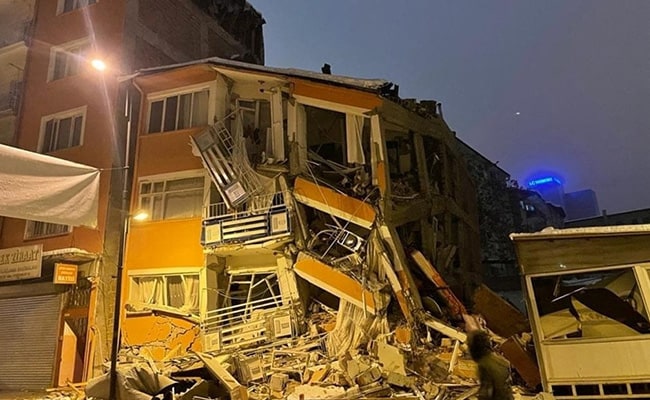
The epicentre of the earthquake was about 26 km east of the Turkish metropolis of Nurdagi.
London:
The magnitude 7.8 earthquake that struck Turkey and Syria on Monday is prone to be one of many deadliest this decade, seismologists mentioned, with a greater than 100 km (62 miles) rupture between the Anatolian and Arabian plates.
Here’s what scientists mentioned occurred beneath the earth’s floor and what to anticipate within the aftermath:
The place did the earthquake originate?
The epicentre was about 26 km east of the Turkish metropolis of Nurdagi at a depth of about 18 km on the East Anatolian Fault. The quake radiated in direction of the northeast, bringing devastation to central Turkey and Syria.
Through the twentieth century, the East Anatolian Fault yielded little main seismic exercise. “If we have been going just by (main) earthquakes that have been recorded by seismometers, it might look roughly clean,” mentioned Roger Musson, an honorary analysis affiliate on the British Geological Survey.
Solely three earthquakes have registered above 6.0 on the Richter Scale since 1970 within the space, in line with the U.S. Geological Survey. However in 1822, a 7.0 quake hit the area, killing an estimated 20,000 individuals.
How dangerous was this earthquake?
On common, there are fewer than 20 quakes over 7.0 magnitude in any 12 months, making Monday’s occasion extreme.
In contrast with the 6.2 earthquake that hit central Italy in 2016 and killed some 300 individuals, the Turkey-Syria earthquake launched 250 instances as a lot power, in line with Joanna Faure Walker, head of the College School London Institute for Threat and Catastrophe Discount.
Solely two of the deadliest earthquakes from 2013 to 2022 have been of the identical magnitude as Monday’s quake.
Why was it so extreme?
The East Anatolian Fault is a strike-slip fault.
In these, strong rock plates are pushing up towards one another throughout a vertical fault line, constructing stress till one lastly slips in a horizontal movement, releasing an amazing quantity of pressure that may set off an earthquake.
The San Andreas Fault in California is probably the world’s most well-known strike-slip fault, with scientists warning {that a} catastrophic quake is lengthy overdue.
The preliminary rupture for the Turkey-Syria earthquake kicked off at a comparatively shallow depth.
“The shaking on the floor floor could have been extra extreme than for a deeper earthquake of the identical magnitude at supply,” David Rothery, a planetary geoscientist on the Open College in Britain, mentioned.
What sort of aftershocks may be anticipated?
Eleven minutes after the preliminary quake, the area was hit by a 6.7-magnitude aftershock. A 7.5-magnitude quake got here hours later, adopted by one other 6.0 spasm within the afternoon.
“What we’re seeing now could be the exercise is spreading to neighbouring faults,” mentioned Musson. “We count on seismicity to proceed for some time.”
After the lethal 1822 occasion, aftershocks carried on into the next 12 months.
What is likely to be the ultimate demise depend be?
Earthquakes of comparable magnitudes in populated areas have killed hundreds of individuals. Nepal’s 7.8-magnitude earthquake in 2015 claimed almost 9,000 lives.
“It is not going to be good,” mentioned Musson. “It will likely be within the hundreds, and could possibly be within the tens of hundreds.”
Chilly winter climate, he added, signifies that individuals trapped beneath rubble have much less likelihood at survival.
(Apart from the headline, this story has not been edited by NDTV workers and is printed from a syndicated feed.)
Featured Video Of The Day
Video: Large Earthquake In Turkey Splits Airport Runway Into Two

